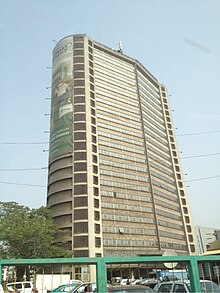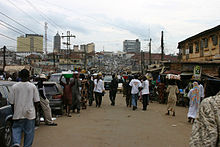Ibadan
| Ibadan | ||
|---|---|---|
|
|
||
| Coordinates | 7 ° 23 ' N , 3 ° 53' E | |
| Basic data | ||
| Country | Nigeria | |
| Oyo | ||
| ISO 3166-2 | NG-OY | |
| height | 239 m | |
| surface | 3080 km² | |
| Residents | 3,306,000 (2017 calculation) | |
| Metropolitan area | 5,881,345 (calculation 2012) | |
| density | 1,073.4 Ew. / km² | |
| founding | 1829 | |
| Post Code | 200211 - 200285 | |
| Website | www.oyostate.gov.ng (English) | |
| politics | ||
| governor | Adebayo Alao-Akala | |
| Political party | PDP | |
|
Ibadan
|
||
Ibadan is a city in Nigeria . It is the capital of the state of Oyo and with its 3,306,000 inhabitants (as of 2017) one of the largest cities in the country alongside Lagos , Benin City and Kano . The Yoruba make up the majority of the population .
geography
Ibadan is located in the south-west of the country, north of the metropolis Lagos and east of the border with Benin . About ten kilometers to the east is the Asejire Reservoir . In the north of the city is the smaller Eleyele reservoir , which is fed by the Alaputa river . The Ona River and its tributary Ogunpa have their source near the city and flow south. There are several hills in the Ibadan area, such as the Mapo in the city center.
population
Ibadan was the largest city in the country until the mid-1950s, when it was overtaken by Lagos. Nevertheless, the city's population has increased more than sixfold since 1950. The Ibadan metropolitan area continues to grow rapidly. The agglomeration is expected to have 8.7 million inhabitants by 2050.
Population development of the agglomeration according to the UN
| year | population |
|---|---|
| 1950 | 450,000 |
| 1960 | 570,000 |
| 1970 | 809,000 |
| 1980 | 1,186,000 |
| 1990 | 1,739,000 |
| 2000 | 2,236,000 |
| 2010 | 2,816,000 |
| 2017 | 3,306,000 |
history
Ibadan was probably founded as a military camp in 1829. At the end of the 19th century, the rapidly growing city had around 150,000 inhabitants and was the largest city in sub-Saharan Africa . In 1893 Ibadan came under British rule . The introduction of cocoa production by the British brought growing prosperity. From 1946 to 1960, Ibadan was the capital of the British Protectorate of South Nigeria and, after independence, the capital of the Western Region for two years. It wasn't until the 1960s that Ibadan's population was surpassed by the capital, Lagos .
In 1959 the first Nigerian television station was established in Ibadan. The city also developed into a literary metropolis. It is also a center of the Jùjú style of music, whose popularity began and continues in the 1940s.
There have been repeated ethnic clashes in the recent past and there have been reports of human rights violations. The hygienic conditions are bad. On December 23, 2001, Justice Minister Bola Ige was shot dead in his home in Ibadan, who spoke out against the introduction of Sharia law in Nigerian states and in favor of the democratization of the country.
Attractions
There is a well-known market and a zoo. The cityscape is mainly characterized by two landmarks: The Cocoa House, the first skyscraper in Africa and the Bower's Tower, a lookout tower built by the British on Oke Aàre (the hill of the Aàre). Other attractions include the University of Ibadan and Mapo Hall , the colonial-style town hall.
economy
Ibadan is one of the country's economic centers. So there are u. a. Food, cigarette and printing industries. The University of Ibadan (founded in 1948) is the oldest in the country. There is also another university and the international institute for tropical agriculture.
sons and daughters of the town
- Mike Adenuga (* 1953), Nigerian entrepreneur
- Toyin Falola (* 1953), Nigerian historian
- Sade Adu (* 1959), Nigerian-British soul and R&B singer
- Hugo Weaving (* 1960), British-Australian actor
- Mutiu Adepoju (* 1970), Nigerian soccer player
- Seyi Olajengbesi (* 1980), Nigerian soccer player
- Sarah Michael (* 1990), Nigerian soccer player
- Larry Kayode (* 1993), Nigerian soccer player
- Peter Olayinka (* 1995), Nigerian soccer player
- Afeez Aremu (* 1999), Nigerian soccer player
Web links
Individual evidence
- ↑ Population data of the metropolitan region of Ibadan ( Memento of the original from December 29, 2011 in the Internet Archive ) Info: The archive link was inserted automatically and has not yet been checked. Please check the original and archive link according to the instructions and then remove this notice.
- ↑ World Urbanization Prospects - Population Division - United Nations. Retrieved July 23, 2018 .
- ↑ Salami, B. Olawale: Ibadan Slaves and Ibadan Wars in Pre-Colonial South Western Nigeria, 1835. In: IOSR Journal Of Humanities And Social Science (IOSR – JHSS), Vol. 7, No. 3, January – February 2013, Pp. 32–38, here p. 35
- ↑ See Christopher A. Waterman: “I'm a Leader, Not a Boss”: Social Identity and Popular Music in Ibadan, Nigeria. In: Ethnomusicology, Vol. 26, No. 1 (25th Anniversary Issue) January 1982, pp. 59-71



